Social interaction is a key part of children’s development, enabling them to learn to communicate, share and interact with others. For children with autism, however, social interaction can be particularly challenging, as they often have difficulty understanding social cues and communicating effectively with others.
This can have a significant impact on their social and emotional development, so it is important to recognize the importance of social interaction for children with autism.
How can children with autism have difficulty interacting with others and how can this affect their social and emotional development?
Children with autism frequently encounter challenges when it comes to social interaction, both with their peers and adults. These challenges often stem from difficulties in understanding social cues, such as facial expressions and gestures, and effectively communicating with others. For example, they may struggle to interpret subtle social cues or maintain eye contact during conversations, which can hinder their ability to form meaningful connections with others. Additionally, autistic children may find it challenging to initiate or sustain conversations, leading to feelings of isolation or frustration in social settings. These social difficulties can profoundly impact their social and emotional development, influencing their self-esteem, sense of belonging, and overall well-being. Therefore, it’s crucial to provide support and guidance to help autistic children navigate social interactions and develop essential social skills for successful communication and relationships. Through targeted interventions and supportive environments, children with autism can enhance their social competence and thrive in social settings.
Friendly relations
Children with autism often face challenges when it comes to forming friendships and engaging in interactive activities with their peers. Due to difficulties in understanding social cues and expressing themselves effectively, they may feel isolated and excluded from social interactions, leading to feelings of low self-esteem and diminished confidence. Additionally, their struggles with recognizing and interpreting the emotions of others can hinder their ability to empathize and connect with their peers, further complicating social interactions. In social situations where understanding social cues and navigating social dynamics are crucial, these challenges can be particularly pronounced. As a result, providing support and guidance to help children with autism develop social skills and navigate social interactions is essential for fostering positive relationships and enhancing their overall well-being. Through targeted interventions and opportunities for social engagement, children with autism can build confidence, improve their social competence, and develop meaningful connections with others. Here is a link if you would like to learn more about this part.

Integration problem
Children with autism often struggle to express their emotions and communicate their needs effectively. This difficulty in both verbal and non-verbal communication can lead to frustration and behavioral challenges such as tantrums or withdrawal from social interactions. Additionally, their limited interests and repetitive behaviors may further isolate them from their peers, hindering their integration into social groups and exacerbating feelings of loneliness.
These social interaction difficulties have a profound impact on the social and emotional development of children with autism. It’s crucial to acknowledge these challenges and provide appropriate support to help them develop essential social skills and navigate social situations successfully. Interventions such as behavioral therapy, play therapy, and group therapy can be valuable tools in this process, offering strategies to enhance communication, promote social engagement, and foster connections with others.
By implementing tailored interventions and creating inclusive environments that foster understanding and acceptance, we can empower children with autism to thrive socially and emotionally. Through targeted support and encouragement, we can help them build meaningful relationships, develop self-confidence, and participate more fully in the world around them.
How can DYNSEO’s COCO app help children with autism interact with others using educational games tailored to their needs?
Dynseo’s COCO app is an educational app that uses adapted games to help children with autism interact with others. This application is designed to help children with autism develop social skills and interact effectively with others using educational games tailored to their specific needs.
Understanding the emotions of others
The app offers a range of educational games specifically designed to support children with autism in understanding the emotions of others. Through engaging activities, children can learn to identify and interpret facial expressions, gestures, and other non-verbal cues that convey emotions. By mastering these skills, children with autism can enhance their ability to navigate social interactions and communicate effectively with others.
For example, interactive games like COCO THINKS and COCO MOVES may prompt children to match facial expressions with corresponding emotions or simulate real-life social scenarios where they must interpret cues to understand how characters are feeling. By providing a safe and interactive environment for learning, the app empowers children to practice and refine their social communication skills at their own pace.
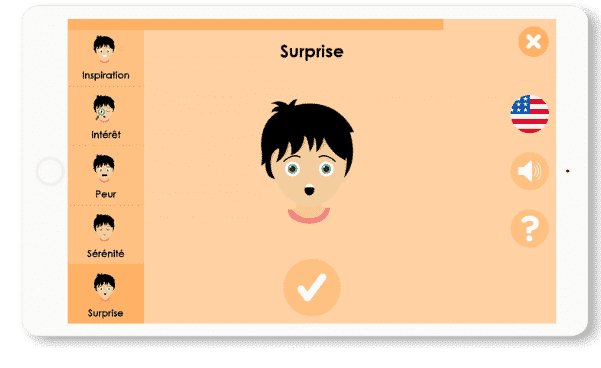
Moreover, the app may incorporate visual aids, such as animated characters or illustrated stories, to illustrate common social situations and emotions in a clear and accessible manner. These visual representations can help reinforce learning and provide valuable context for understanding the complexities of social interaction.
Overall, the app serves as a valuable tool for supporting the social and emotional development of children with autism, equipping them with the skills and confidence they need to engage meaningfully with the world around them. Through engaging gameplay and targeted learning experiences, children can build essential social communication skills that promote greater independence and inclusion in their daily lives.
Communication skills
Furthermore, the COCO app plays a crucial role in fostering the self-esteem of children with autism. By providing opportunities for positive social interactions and meaningful connections with others, the app enables children to experience a sense of validation, acceptance, and understanding. These affirming experiences can contribute to a bolstered sense of self-worth and belonging, empowering children to navigate social interactions with greater confidence and ease.
For instance, through engaging activities and games within the app, children with autism can receive praise, encouragement, and recognition for their achievements and efforts. This positive reinforcement helps reinforce their strengths and capabilities, fostering a sense of pride and accomplishment. Moreover, the supportive and inclusive environment created by the app cultivates a sense of belonging and acceptance, where children feel valued for who they are.
As a result, children with autism are more likely to feel at ease and comfortable in social settings, leading to improved overall well-being and quality of life. By promoting positive self-perceptions and facilitating meaningful social connections, the COCO app empowers children with autism to navigate the world with confidence and resilience. Through its innovative approach to supporting social and emotional development, COCO helps children with autism thrive and flourish in their social interactions and relationships.
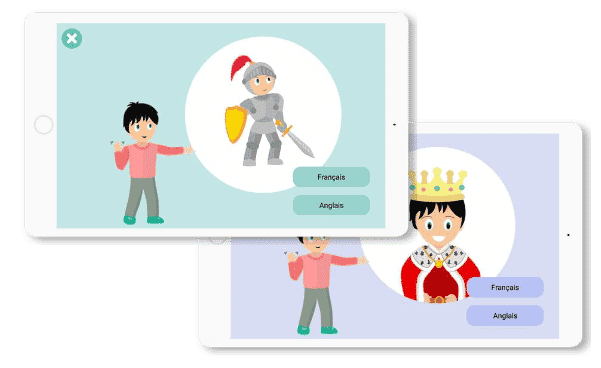
Game skills
Finally, the COCO app can help children with autism develop play skills by providing activities tailored to their specific needs. Children can learn to play interactively, share and cooperate with others. This can help them interact more effectively with others and feel more comfortable in social situations.
Ultimately, the app can be a useful tool to help children with autism interact with others using educational games tailored to their needs. By providing activities focused on social skill development, communication, and play, this app can help children with autism learn the skills necessary to interact effectively with others and enhance their social and emotional development.
Which therapies can help a child with autism?
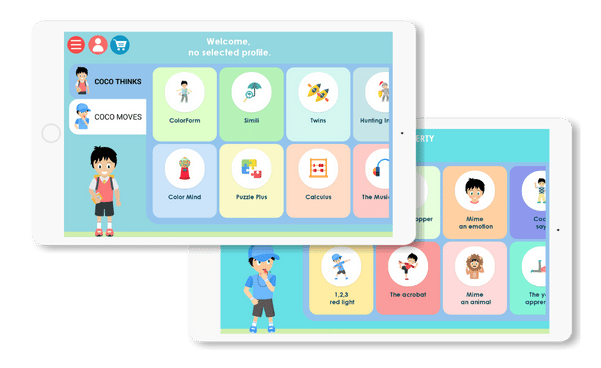
Understanding the emotions of a person with autism
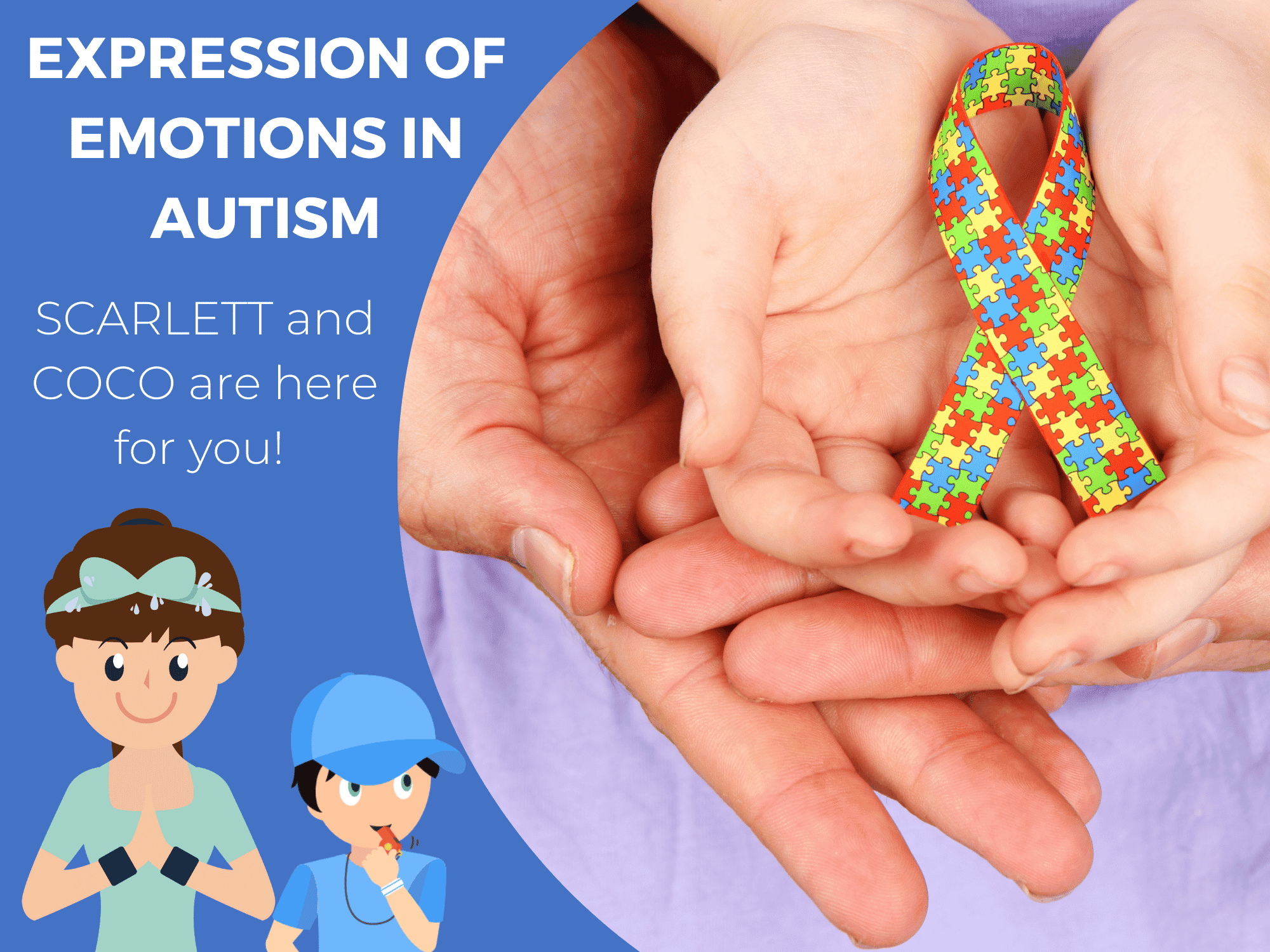
What happens if the child with autism is not able to interact?
Indeed, social interaction plays a pivotal role in shaping the social, emotional, and cognitive development of children, laying the foundation for their future experiences and relationships. The absence of meaningful social engagement can have profound repercussions on their overall well-being and long-term outcomes. For children with autism, who often face challenges in social communication and interaction, the impact can be particularly pronounced.
Without opportunities for social interaction, children with autism may experience feelings of isolation and alienation, unable to fully connect with their peers or participate in social activities. This sense of disconnection and misunderstanding can exacerbate feelings of loneliness and frustration, contributing to the development of mental health issues such as anxiety and depression.
Furthermore, the inability to engage in reciprocal social exchanges may impede the development of crucial social skills, such as empathy, cooperation, and perspective-taking. As a result, children with autism may struggle to navigate social situations effectively, leading to difficulties in forming meaningful relationships and integrating into social settings.
Addressing the social needs of children with autism is therefore essential for promoting their overall well-being and fostering positive social and emotional development. By providing support, understanding, and opportunities for social engagement, we can help mitigate the adverse effects of social isolation and empower children with autism to thrive in their interactions with others.
Frustration and inappropriate behaviour
Furthermore, the inability to engage in social interaction may exacerbate feelings of isolation and alienation, potentially triggering mental health issues such as anxiety and depression. Without the ability to communicate effectively, children with autism may experience heightened frustration and resort to unadaptive behaviors to express their needs and desires. These behaviors, ranging from repetitive actions like hand-waving or hand-twisting to outbursts such as tantrums or panic attacks, underscore the critical importance of fostering social interaction skills in children with autism for their overall well-being and development.
Isolation
Additionally, social isolation can detrimentally affect the mental well-being of children with autism, exacerbating feelings of exclusion, sadness, and loneliness. Unable to engage in social interactions, these children may experience a sense of disconnection from their peers and surroundings, further intensifying their feelings of isolation. This sense of detachment can erode their self-esteem and confidence, contributing to a cycle of negative emotions and social withdrawal. Therefore, addressing social isolation is crucial for promoting the mental health and overall well-being of children with autism, fostering a sense of belonging and inclusion within their social environment.
Strategies adapted to the needs
It’s crucial to recognize the individuality of each child with autism, as the impact of social interaction challenges can vary based on their specific needs and surroundings. Thus, personalized strategies are essential to facilitate effective communication and interaction for each child.
Numerous educational programs aim to assist children with autism in enhancing their social skills and fostering interaction. One notable example is the “PEERS” program, renowned for its evidence-based approach in supporting adolescents with autism to develop vital social skills and engage more effectively with their peers. Through tailored interventions like these, children with autism can receive targeted support to navigate social situations and improve their overall social functioning.

It focuses on teaching social skills such as conversation, conflict management and inviting people to social events. He also uses techniques such as social coaching and feedback to help teens improve their communication and social interaction.
It is important to note that each child with autism is unique and the needs and strategies that work for one child may not work for another. It is therefore crucial to work with qualified professionals to develop individualized treatment plans tailored to the specific needs of each child with autism.
How long does it take an autistic person to interact?
The timeframe for a child with autism to engage in social interaction is highly individualized, influenced by a spectrum of factors including the child’s age, developmental stage, and unique characteristics. Given the challenges inherent in understanding social cues and norms; which are often more nuanced and complex for individuals with autism, the process of social interaction may require a considerable amount of time and patience. It involves not only learning to recognize and interpret social signals but also adapting behaviors and responses accordingly. Additionally, the level of support and intervention provided, as well as the child’s environment and opportunities for social engagement, play significant roles in shaping the pace and efficacy of their social development. Thus, it is imperative to adopt an individualized approach, offering tailored strategies and consistent support to facilitate the child’s journey towards successful social interaction and integration.
How can parents help their children with autism?
Parents can play a vital role in helping their child with autism develop social skills and improve social interaction. Here are some examples of how parents can help their child with autism:
Understand their child’s needs
Understanding and meeting the needs of a child with autism requires ongoing parental commitment and sensitivity. Parents can cultivate a deeper understanding of their child’s unique needs and interests through attentive observation and active engagement. By tuning into their child’s cues and preferences, parents can foster meaningful interactions that resonate with their child’s individuality. Additionally, parents can proactively identify potential stressors or triggers that may elicit anxiety or discomfort for their child. Through proactive planning and supportive interventions, such as implementing calming techniques or providing reassurance, parents can help alleviate their child’s distress and promote emotional well-being. By prioritizing empathy, patience, proactive communication, etc… parents can strengthen their connection with their child and create a nurturing environment where their child feels understood, supported, and valued…
Emotional support
Children with autism often encounter challenges in understanding and regulating their emotions, requiring significant support from parents to navigate these complexities effectively. Parents play a pivotal role in providing emotional guidance and aiding their child in comprehending and coping with their feelings. Employing strategies like visualization exercises or open discussions can facilitate emotional awareness and expression in children with autism, empowering them to articulate their emotions in constructive ways. Through patient and empathetic guidance, parents can help their child develop essential emotional skills and build resilience in managing their emotional experiences. By fostering a supportive and understanding environment, parents contribute to their child’s emotional well-being and overall development.

Encourage social interaction
Parents play a crucial role in supporting their child with autism in developing social skills through various interventions and activities. Encouraging participation in social activities with peers provides valuable opportunities for children to practice and refine their social interactions. Additionally, organizing role-playing scenarios tailored to specific social skills, such as communication or problem-solving, can offer structured practice in real-life situations. These role plays allow children to experiment with different social behaviors in a safe and supportive environment, helping them build confidence and competence in social interactions over time. By actively engaging in these activities with their child, parents reinforce social learning and provide essential guidance and support along the way. Through consistent encouragement and targeted practice, parents can empower their child with autism to navigate social situations more effectively and foster meaningful connections with others.
Collaborate with professionals
Collaborating with mental health professionals is instrumental in supporting children with autism in their social skill development journey. Parents can seek guidance from psychologists, therapists, special educators, and other health professionals to create a personalized action plan tailored to their child’s unique needs. These professionals can conduct comprehensive assessments to identify areas of strength and areas needing improvement, guiding the development of targeted interventions and strategies. Through individualized therapy sessions, social skills groups, or specialized educational programs, children receive tailored support to enhance their social interactions and communication abilities. Additionally, mental health professionals provide valuable resources and guidance for parents, empowering them with the knowledge and skills needed to effectively support their child’s social development at home and in various social settings. By fostering a collaborative partnership with mental health professionals, parents can ensure their child receives comprehensive and holistic support to thrive socially and emotionally.
Discover the COCO THINKS and COCO MOVES app
The COCO THINKS and COCO MOVES app contains more than 30 educational games to work on English, math, logic, memory or attention.
In addition, the application imposes a sports break every 15 minutes of screen time to teach a measured use of screens.
Much smarter than a parental control!
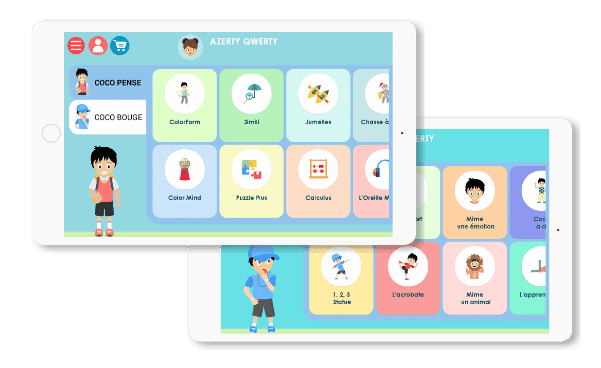
Other articles that might interest you:
Using Technology to Enhance Communication in Autism Speech Therapy
Autism Spectrum Disorder (ASD) presents unique challenges in communication, making speech therapy an essential...
Effective Autism Behavior Therapy: Improving Outcomes
Autism is a complex neurodevelopmental disorder that affects individuals in various ways. It is characterized by...
Autism Therapy at Home: Effective Strategies
Autism Spectrum Disorder (ASD) is a neurodevelopmental disorder that affects individuals in various ways. It is...








